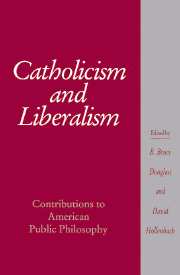Book contents
- Frontmatter
- Contents
- List of contributors
- Preface
- Introduction
- PART I HISTORICAL CONFLICTS AND DEVELOPMENTS
- 1 The failed encounter: the Catholic church and liberalism in the nineteenth century
- 2 American Catholics and liberalism, 1789–1960
- 3 Vatican II and the encounter between Catholicism and liberalism
- 4 Liberalism after the good times: the “end of history” in historical perspective
- PART II NEW ENCOUNTERS AND THEORETICAL RECONSTRUCTIONS
- PART III PRACTICES AND INSTITUTIONS
- Afterword: a community of freedom
- Index
2 - American Catholics and liberalism, 1789–1960
Published online by Cambridge University Press: 19 February 2010
- Frontmatter
- Contents
- List of contributors
- Preface
- Introduction
- PART I HISTORICAL CONFLICTS AND DEVELOPMENTS
- 1 The failed encounter: the Catholic church and liberalism in the nineteenth century
- 2 American Catholics and liberalism, 1789–1960
- 3 Vatican II and the encounter between Catholicism and liberalism
- 4 Liberalism after the good times: the “end of history” in historical perspective
- PART II NEW ENCOUNTERS AND THEORETICAL RECONSTRUCTIONS
- PART III PRACTICES AND INSTITUTIONS
- Afterword: a community of freedom
- Index
Summary
“Liberalism” has meant different things to different people at different times and places. Before saying anything about the historic relationship between Catholicism and liberalism in the United States we must therefore take a moment to indicate briefly how it will be understood in what follows. We begin by recalling a distinction made by the once-famous Catholic historian Carlton J. H. Hayes between “ecumenical liberalism” and “sectarian liberalism.”
Hayes introduced the distinction in his Generation of Materialism (1941), a work covering Europe as a whole in the late nineteenth century. By “ecumenical,” or “general,” liberalism, he meant the spirit animating developments from the Reformation through the French Revolution and its aftermath that sought to limit despotism and promote representative government, eliminate restrictions on commerce and industry, protect freedom of conscience in matters of religion, and in general champion the rights of the individual against the claims of traditional authority in church or state. This broad and diffuse liberalism included many subspecies – political, economic, intellectual; conservative, moderate, radical, atheistic, even Christian.
Of “ecumenical liberalism” thus understood, Hayes clearly approved. The sudden emergence of “sectarian liberalism” in the 1870s, however, struck him as “something like a calamity,” for the excesses of its adherents, who appropriated the name to themselves alone, went far toward discrediting the whole tradition. The new version was not, of course, unrelated to ecumenical liberalism; the Liberals with a capital “L” did indeed take over genuine elements of the tradition, such as concern for personal liberty, devotion to science and secular schooling, and a commitment to parliamentary government and laissez-faire economics as the master keys to material progress.
- Type
- Chapter
- Information
- Catholicism and LiberalismContributions to American Public Policy, pp. 45 - 75Publisher: Cambridge University PressPrint publication year: 1994
- 1
- Cited by



